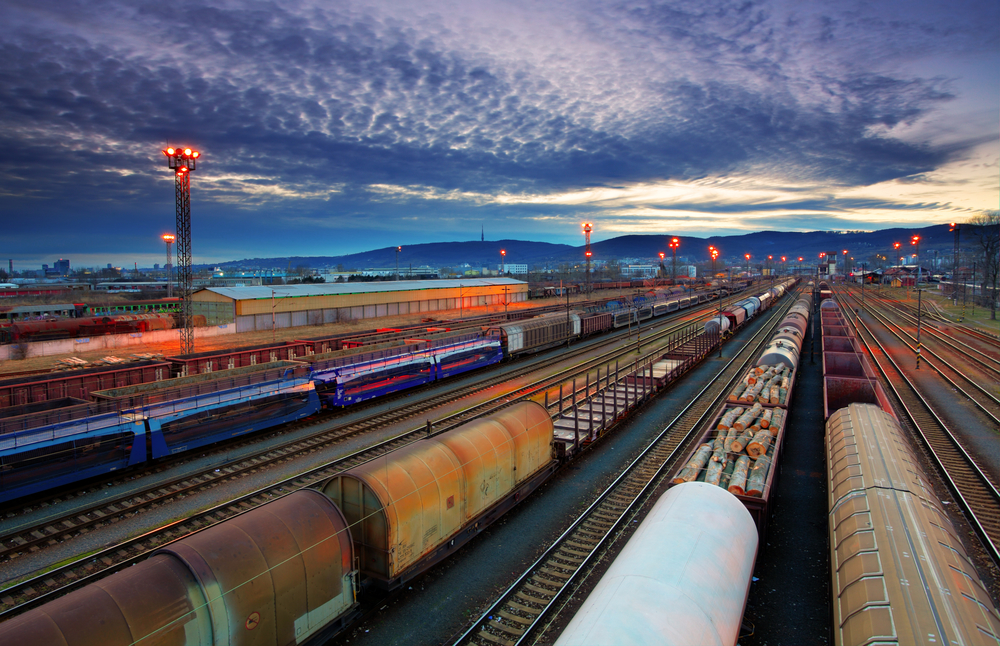Aiming to become the largest transit hub for cargo and goods in Eurasia, Kazakhstan is continuing to build out its infrastructure through a $9 billion state-wide plan known as Nurly Zhol, or “bright path” in Kazkakh, launched by President Nursultan Nazarbayev in 2015.
Although Kazakhstan has access to the Caspian Sea via its western border, Nurly Zhol prioritizes the development of the country’s railways and roads with an eye towards its eastern neighbor and economic giant China. Nazarbayev is hoping his country will act as a corridor for networks that essentially bypass Russia, as goods move from China to Europe.
A railway linking the cities of Almaty and Shu, both located in Kazakhstan’s deep south, will speed transportation for passengers and cargo traveling between these cities. The new line is considered important for developing the country’s economy, as both cities play a critical juncture in moving goods from east to west and north to south.
“In general, the Almaty-Shu construction project will increase carrying capacity of this section, which will, in turn, increase the transit potential of cargo transportation in the direction of China-Europe,” Roman Sklyar, Kazakhstan’s Vice Minister of Investment and Development said last week at a press briefing.
Both Almaty and Shu are located nearby the country’s southern border with Kyrgyzstan. While the distance between these two cities amounts to nearly 300 kilometers, the length of the second railway track amounts to 111 kilometers. Sklyar says some 52 kilometers of the railway track have been already finished, and construction should be completed by the end of the year.
With a territory measuring more than 2.7 million square kilometers, Kazakhstan is the world’s ninth largest country and stretches between western China and the Caspian Sea. Despite sitting on one of the world’s largest reserves of fossil fuels – roughly 30 billion barrels of oil and 2.4 trillion cubic meters of gas – Kazakhstan is moving ahead with efforts to diversify its economy, in order to safeguard itself against global price fluctuations with oil and gas.
A drop in crude oil prices in 2015 pushed Astana to launch new state programs, including Nurly Zhol, which forms part of China’s “One Belt, One Road” (OBOR) initiative that is set to become the world’s largest global trade network. Announced by Xi Jinping in 2013, OBOR will form a vast network of overland and sea trade routes stretching from China to western Europe.
Kazakhstan is considered significant for China’s energy security, as it absorbs 15 percent of Kazakhstan’s exports, including oil and oil-based products, coal and gas. In addition, the geographical location and security of transport routes passing through Kazakhstan benefits Beijing, which aims at reviving the legendary Silk Road trade route through OBOR.
Long before signing an agreement to link Nurly Zhol to OBOR, Kazakhstan and China launched mega-construction projects. In 2013, the two countries laid down nearly 1,500 kilometers of railway lines that connect western China with the Caspian Sea and Europe, as well 3,000 kilometers of highways. In June, Beijing and Astana signed another agreement to strengthen cooperation in the realms of energy, construction machinery, the automotive industry, as well as food and textiles.
“The New Economic Policy, Nurly Zhol, will become a driver of the growth in our economy during the coming years. 200,000 new jobs will be created through the construction of roads alone, and this means greater employment and a growth in income for the population,” Nazerbayev said in a speech in 2014.
Nazarbayev sees Nurly Zhol and Kazakhstan’s cooperation with China vis-à-vis OBOR as the keys to becoming one of the 30 most developed countries in the world. Currently Kazakhstan ranks 50th, according to US government data.







 President Aliyev emphasized the critical role of the North-South Transport Corridor in fostering transport cooperation between Azerbaijan and Russi...
President Aliyev emphasized the critical role of the North-South Transport Corridor in fostering transport cooperation between Azerbaijan and Russi...
 Russian Foreign Minister Sergei Lavrov has reasserted that Moscow has no intentions to stop the fighting in Ukraine, even if peace talks commence.
Russian Foreign Minister Sergei Lavrov has reasserted that Moscow has no intentions to stop the fighting in Ukraine, even if peace talks commence.
 Iran has refuted reports of alleged damage to Shimon Peres Negev Nuclear Research Centre located southeast of Dimona, Israel, during the recent air...
Iran has refuted reports of alleged damage to Shimon Peres Negev Nuclear Research Centre located southeast of Dimona, Israel, during the recent air...
 Iran and Pakistan have signed eight cooperation documents in various fields, and agreed to strengthen ties to fight terrorism in the region.
Iran and Pakistan have signed eight cooperation documents in various fields, and agreed to strengthen ties to fight terrorism in the region.



